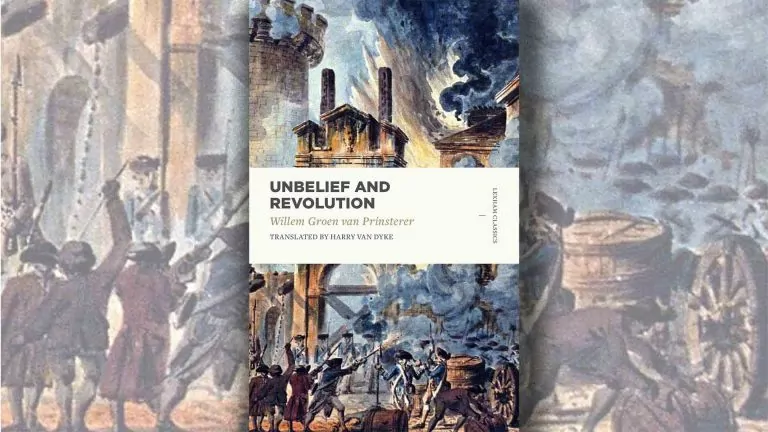Unbelief and Revolution
by Guillaume Groen van Prinsterer
translated by Harry Van Dyke
1847/2018 / 280 pages
As explained in the Encyclopedia Britannica, “Revolution, in social and political science, [is] a major, sudden, and hence typically violent alteration in government and in related associations and structures.”
We use the term “revolution” for various political and social changes in history, the most recent being the Sexual Revolution of the 1960s. In Canada, and the West more generally, we’ve seen evidence of a social and cultural revolution as our society increasingly rejects the Christian values and principles on which our nation is founded.
To respond appropriately to modern revolutions, we need to understand what forces are behind them. Guillaume Groen van Prinsterer addresses the idea of revolution in his book Unbelief and Revolution, which explains the thinking behind the French Revolution at the end of the 18th century.
The French Revolution was a violent political and social revolution which resulted in tens of thousands of deaths. The events of the French Revolution may seem in the distant past, a one-time event, never to be repeated. Instead, “the central message of the book is that the French Revolution is not actually over but lives on in its ideas, and these ideas are dangerous for society.”
These ideas were dangerous to van Prinsterer’s society in 19th century Netherlands and remain dangerous to 21st century Canadians. While certain components of Unbelief and Revolution are understandably contextual to van Prinsterer’s time, many of the ideas live on and provide a way for contemporary Christians to think about faith, freedom, and revolution.
Three Problems
Unbelief
The main idea of Unbelief and Revolution is that “the cause of the Revolution lies in unbelief.” This unbelief was evident theologically, as it sought to remove God’s Word as an authority and replace it with human reason. But it was also seen politically, as the French Revolution replaced the sovereignty of God with the sovereignty of man. The Revolution was an anti-Christian revolution; Instead of looking to the Bible for truth, men trusted in their own reason. With the removal of God came the removal of a foundation for morality.
Lest we think this was just a one-time event, van Prinsterer seeks to demonstrate how these ideas became increasingly accepted throughout the course of the 18th century, culminating in the events of the French Revolution. The revolutionary ideas also lived on after the French Revolution. Decades after the French Revolution, he wrote, “For all its excellences, modern society, having fallen into bondage to the theory of unbelief, is increasingly being seduced into a systematic repudiation of the living God.” To van Prinsterer, it’s not just about the French Revolution. Rather, unbelief led to the French Revolution, and continued unbelief would lead to further atrocities as men continued to replace God with themselves.
Liberty
One of the main ideas behind this systematic unbelief was a false theory of liberty. It was believed that liberty could be achieved by giving power to citizens, who would then grant authority to whomever they chose. Instead of viewing the state as receiving its authority from a sovereign God, the state was viewed as a delegation which was given authority by the majority of citizens. Those who received authority from the people then had the power to protect and rescue the people from their political and social problems.
However, when political authority is not viewed as coming from a sovereign God, it instead leads to tyranny. A government that sees its power as given by the people could result in one of two things: anarchy or tyranny. Either the rights of the citizens would be destroyed through tyranny, or the rights of the state would be destroyed through anarchy.
The State
In the French Revolution, the state indeed became absolute. Take for example the Reign of Terror in 1793 and 1794. The focus became the:
“unconditional promotion of the common good or public safety … public safety – a fatal expression, which implies sacrificing morality to what they are agreed to call the interest of the state, that is to say, sacrificing morality to the passions of those who govern.”
Everything became about the well-being of the state, and since the people had given authority to the state, everyone was expected to submit to the accepted majority opinion.
And what was the majority opinion? Essentially, it was whatever the state determined it to be. That also meant exterminating any opposition and justifying anything that pursued the goal of the common good. In reaction to the Reign of Terror, people wanted an orderly society, so they simply gave up their liberty to maintain order.
In one phase of the French Revolution, the people sought liberty without order, and in the next, they sought order without liberty. Although one of the principles of the Revolution was liberty, the result was the destruction of liberty. In the end, the French Revolution is but one example of what can happen when society rejects the authority of God and His Word.
Contemporary Similarities
Secularism
But this isn’t simply a book about various interesting facts surrounding the French Revolution. Although it was written nearly 200 years ago, we can see the dangers of unbelief today as well. Modern-day Canada is a post-Christian and increasingly secular society. We too have largely removed God and His Word as a basis for morality and truth and have raised man to the place of God. Our laws are increasingly disconnected from objective truth and a moral foundation. We “want to retain the conclusions while abandoning the premises.” We want the good that our Christian foundation has given to society, while discarding the Christian foundation itself.
This discarding of the Christian foundation might start in a way that seems harmless to much of society. It starts as an effort to be “neutral,” to not enforce a particular morality or religion. First, God is removed from lawmaking and governance. Next, any objective standard for the structure of the world and of government is discarded. At the same time, objective truth and ethical standards cease to apply.
The result is that those in power can essentially choose what is right and wrong and apply it as they see fit. When we abandon the premises, the conclusions also fade away. Right and wrong become arbitrary.
Liberty and Equality
As in the time of the French Revolution, our society has a false idea of liberty and equality. While Christians might understand that the government receives its authority from God (Romans 13), we often talk in a way that indicates a belief that state authority comes from the people, through our democratic processes. We see a heightened emphasis on liberty, particularly sexual liberty to do as one pleases, as well as increased attention to social inequalities. And, in so many ways, our society relies on the government to protect that liberty and equality. Advocates of sexual liberty want the government to endorse their choices, and this is happening because we have removed any foundation for morality. In terms of equality, the government is seen as the saviour from racial or sexual discrimination, whether through laws or through the courts and human rights tribunals. As people suffer the consequences of their unbelief and their immoral actions, they call on the state to save them from their problems.
The State and Neutrality
When so many focus on the government as the source of their liberty, by permission of the people, the government also chooses what is acceptable and what is not. One area where we can see this clearly is in conversations about hate speech legislation. Ultimately, it will be the government deciding what is, and what is not, hate speech. Van Prinsterer writes about various freedoms that were developed in the century leading up to the Revolution. These included freedoms such as equality, liberty, property, freedom of the press, and freedom of religion. But each of these were also subject to limits. “That the rights are restricted does not offend me; this is inherent in every right,” writes van Prinsterer. “The cause of my complaint is that whereas rights used to be circumscribed and confirmed by the unchangeable laws and ordinances of God, they are now made to depend on the good pleasure of the State.”
Our modern Canadian society emphasizes neutrality. The idea is that you cannot let your religion influence the law, because that would not maintain neutrality. Yet we cannot escape the fact that everyone is shaped by their beliefs, no matter what those may be. Unbelief in itself is a particular perspective of the world which shapes how people act. The idea of tolerance of differing ideas, or “just getting along” is challenged by the direct opposition of belief and unbelief. In our current context, revolutionary ideas of liberty and equality are increasingly common, and the majority has supposedly given the government power to determine what those look like regarding sexuality, speech, and human life and dignity.
Three Key Takeaways
The only solution is belief
The problems of the French Revolution, and of the revolutionary ideas in general, happened because of unbelief. The solution to these problems, then, is belief; returning to the truth of God’s Word and His sovereignty. In contrast to the ideas of liberty in the Revolution, the Protestant Reformation properly understood liberty; “a liberty that is grounded in submission. Liberty is the consequence, the principle is submission.” We are able to submit to the truth of God’s Word and to legitimate authority, as well as maintain the freedom to fulfill our duties. Our liberties are based in God’s Word and His sovereignty.
Additionally, since He has given authority to our government, that authority is limited by what He commands. As van Prinsterer writes:
“then we see that apostasy from him who has said, ‘I am the way, the truth, and the life,’ was the cause of the whole Revolution. Then we see that the active confession of the only Saviour is the means of restoration and salvation.”
Likewise, the solution to secularism today lies in a recognition of God’s sovereignty and in the infallibility of His Word.
Ideas have consequences
It is also important to remember that ideas have consequences. The people behind the events of the French Revolution, such as Robespierre during the Reign of Terror, truly believed in the ideas they were fighting for. They were convinced by ideas and philosophers that had come before them and carried out those ideas in practice. “Let us henceforward be mindful of the connection between thought and deed, and never again forget that theory leads to practice.” The same is true of believers who put their trust in Christ and rely on God’s Word as truth. When we understand the biblical perspective, this shows itself in how we act.
We can take action
As much as I find the French Revolution fascinating, it is discouraging to see the evil perpetrated, particularly along with van Prinsterer’s argument that this is a natural consequence of unbelief that lives on today. Van Prinsterer was concerned about the ideas of the Revolution, and that also led to a period of political action and political change. As he writes, “Even in unfavorable circumstances, however, one can witness to the truth; and this continuous witness itself is already a real application and a powerful practice.”We too can be anti-revolutionaries, in the sense that we oppose unbelief and proclaim the truth of God’s Word. “Let us be faithful, each in his station” (p. 246), and let us pray for revival in Canada so that faith will prevail over unbelief. “Let us always remember that the cry, ‘Help thou mine unbelief!’ is preceded by the shout of joy, ‘Lord, I believe!’.” And as we do so, let’s also remember the words of Christ telling us to “be of good cheer, I have overcome the world” (John 16:33b).
Daniel Zekveld is a policy analyst with ARPA Canada.












